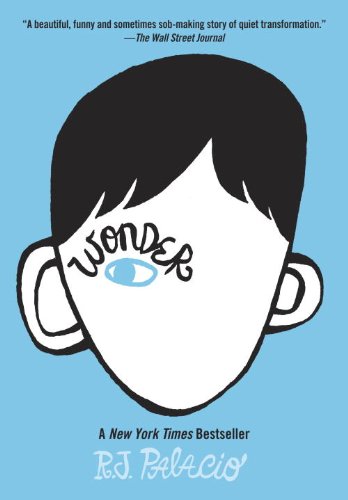The Bell Jar
by Sylvia Plath
288 pages
Amazon.com Review: Plath was an excellent poet but is known to many for this largely autobiographical novel. The Bell Jar tells the story of a gifted young woman's mental breakdown beginning during a summer internship as a junior editor at a magazine in New York City in the early 1950s. The real Plath committed suicide in 1963 and left behind this scathingly sad, honest and perfectly-written book, which remains one of the best-told tales of a woman's descent into insanity.
Wonder
by R. J. Palacio
320 pages
Amazon Book Description: I won't describe what I look like. Whatever you're thinking, it's probably worse.
August Pullman was born with a facial deformity that, up until now, has prevented him from going to a mainstream school. Starting 5th grade at Beecher Prep, he wants nothing more than to be treated as an ordinary kid—but his new classmates can’t get past Auggie’s extraordinary face. WONDER, now a #1 New York Times bestseller and included on the Texas Bluebonnet Award master list, begins from Auggie’s point of view, but soon switches to include his classmates, his sister, her boyfriend, and others. These perspectives converge in a portrait of one community’s struggle with empathy, compassion, and acceptance.
"Wonder is the best kids' book of the year," said Emily Bazelon, senior editor at Slate.com and author of Sticks and Stones: Defeating the Culture of Bullying and Rediscovering the Power of Character and Empathy. In a world where bullying among young people is an epidemic, this is a refreshing new narrative full of heart and hope. R.J. Palacio has called her debut novel “a meditation on kindness” —indeed, every reader will come away with a greater appreciation for the simple courage of friendship. Auggie is a hero to root for, a diamond in the rough who proves that you can’t blend in when you were born to stand out.
The Thirteenth Tale
by Diane Settlerfield
432 pages
Review from Publishers Weekly: Former academic Setterfield pays tribute in her debut to Brontë and du Maurier heroines: a plain girl gets wrapped up in a dark, haunted ruin of a house, which guards family secrets that are not hers and that she must discover at her peril. Margaret Lea, a London bookseller's daughter, has written an obscure biography that suggests deep understanding of siblings. She is contacted by renowned aging author Vida Winter, who finally wishes to tell her own, long-hidden, life story. Margaret travels to Yorkshire, where she interviews the dying writer, walks the remains of her estate at Angelfield and tries to verify the old woman's tale of a governess, a ghost and more than one abandoned baby. With the aid of colorful Aurelius Love, Margaret puzzles out generations of Angelfield: destructive Uncle Charlie; his elusive sister, Isabelle; their unhappy parents; Isabelle's twin daughters, Adeline and Emmeline; and the children's caretakers. Contending with ghosts and with a (mostly) scary
bunch of living people, Setterfield's sensible heroine is, like Jane Eyre, full of repressed feeling—and is unprepared for both heartache and romance. And like Jane, she's a real reader and makes a terrific narrator. That's where the comparisons end, but Setterfield, who lives in Yorkshire, offers graceful storytelling that has its own pleasures. (Sept.)
Copyright © Reed Business Information, a division of Reed Elsevier Inc. All rights reserved.
Saturday, November 16, 2013
Subscribe to:
Post Comments (Atom)



No comments:
Post a Comment